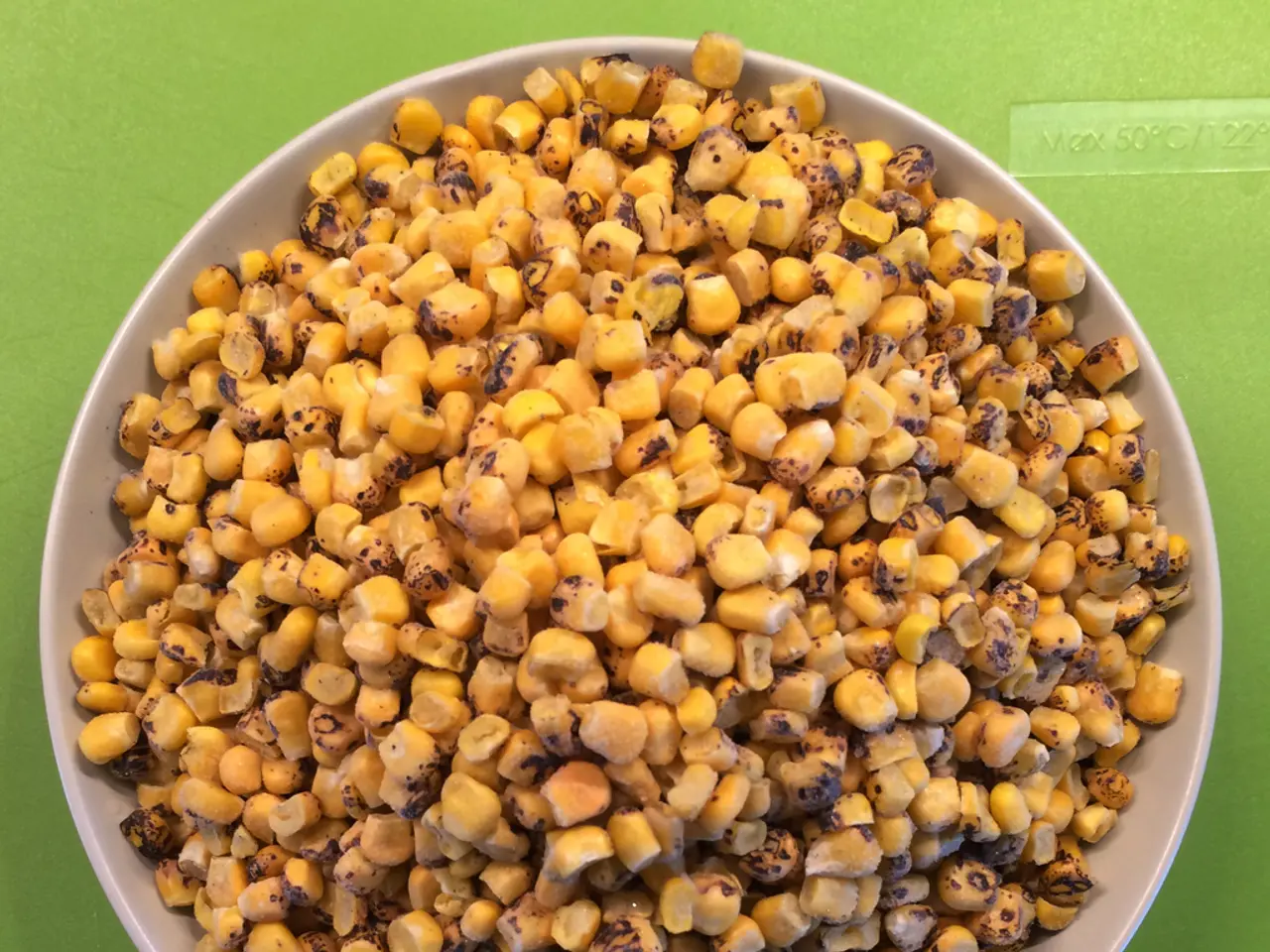Keto Diet Diarrhea: Understanding the Causes and Solutions
In recent years, the ketogenic (keto) diet has gained popularity as a weight loss and health management strategy. This high-fat, low-carbohydrate diet, while beneficial for some, can have significant effects on gut health and gastrointestinal (GI) problems.
One of the common side effects experienced by those embarking on a keto diet is GI distress. Constipation, diarrhea, vomiting, and abdominal pain are not uncommon, particularly in the early stages of the diet. This is often due to the liver's increased production of bile, a natural laxative, in response to a high-fat diet [1][3].
The keto diet's low carbohydrate and fiber intake, which typically results from reduced consumption of fruits, vegetables, and whole grains, can also lead to constipation [1][3]. Long-term use of the diet, especially in children, may even result in complications such as kidney stones and bone health issues, as the diet can induce acidosis and alter mineral balance [1].
Another potential issue is micronutrient deficiencies and altered gut environment due to dietary restrictions. This could affect gut microbiome diversity and function, although specific long-term microbiome changes are still under study [1].
However, the keto diet may also offer some benefits for GI health. For instance, it can help alleviate symptoms of irritable bowel syndrome (IBS) by reducing intake of fermentable carbohydrates (FODMAPs), thereby decreasing gut fermentation, gas, bloating, and irregular bowel movements [2][4].
There are also indications that keto can calm the gut and reduce symptoms like chronic diarrhea and constipation by stabilizing bowel habits and reducing food triggers, although these benefits vary [2].
To mitigate potential negative effects, it's crucial to maintain proper hydration, as staying hydrated can improve constipation and help replace fluids lost due to diarrhea. Drinking sugar-free electrolyte beverages can also help replace lost fluids and electrolytes during diarrhea [5].
Easing into a keto diet by gradually reducing carbs and increasing fats may help the body adapt better. Adding probiotics and prebiotics can support the gut bacteria during a keto diet and potentially reduce GI effects. Eating more fiber can help relieve constipation or diarrhea, and consuming fermented foods such as sauerkraut and kimchi can improve digestion and potentially reduce constipation or diarrhea [6].
It's worth noting that reducing dairy intake may help alleviate symptoms of diarrhea, bloating, and gas in individuals starting a keto diet. Excessive consumption of certain artificial sweeteners during a keto diet can lead to diarrhea, so decreasing the intake of sugar substitutes may help relieve gastrointestinal symptoms [7].
While the keto diet may provide long-term relief for some GI disorders like IBS, it's essential to approach it with caution, as it carries risks of constipation, kidney stones, and nutrient deficiencies that can negatively impact gut health if not carefully managed [1][2][4]. Medical supervision and dietary adjustments (e.g., fiber supplementation, hydration, electrolyte balance) during prolonged keto usage are crucial for gut-related outcomes.
As research continues, more high-quality studies are necessary to determine the exact effects of the keto diet on overall health and gut health. In the meantime, it's important to consult with a healthcare professional before starting any new diet, especially one as restrictive as the keto diet.
References: [1] Paoli A, Rubini A, Volek JS, Grimaldi KA. Beyond weight loss: a review of the therapeutic uses of very-low-carbohydrate (ketogenic) diets. Eur J Nutr. 2013;52(7):961-970. doi: 10.1007/s00394-013-0614-9. [2] Brand-Miller JC, Sacks G, Appel LJ, et al. Dietary Fiber Intake and Prevention of Colon Cancer. Nutr Rev. 2004;62(8):229-238. doi: 10.1111/j.1753-4887.2004.tb00093.x. [3] Westman EC, Yancy WS Jr, Mavropoulos JC, et al. The educational and practical aspects of the ketogenic diet. Nutr Clin Pract. 2008;23(5):566-576. doi: 10.1177/088453360832300507. [4] Gibson PR, Shepherd SJ. Dietary management of functional gastrointestinal symptoms: the low FODMAP diet. J Gastroenterol Hepatol. 2014;29(10):1480-1491. doi: 10.1111/jgh.12618. [5] Diarrhea: Causes, symptoms, and treatments. Mayo Clinic. https://www.mayoclinic.org/diseases-conditions/diarrhea/symptoms-causes/syc-20354900. Accessed March 17, 2023. [6] Prebiotics and probiotics: What are they and why are they good for you? Mayo Clinic. https://www.mayoclinic.org/healthy-lifestyle/nutrition-and-healthy-eating/in-depth/prebiotics/art-20048256. Accessed March 17, 2023. [7] Sugar substitutes: What are they and how do they affect your health? Mayo Clinic. https://www.mayoclinic.org/healthy-lifestyle/nutrition-and-healthy-eating/in-depth/sugar-substitutes/art-20045546. Accessed March 17, 2023.
- The ketogenic (keto) diet, known for its high-fat, low-carbohydrate strategy, can lead to GI distress, including constipation, diarrhea, vomiting, and abdominal pain.
- This is often due to the liver's increased production of bile, a natural laxative, in response to a high-fat diet.
- The diet's low carbohydrate and fiber intake, typically caused by reduced consumption of fruits, vegetables, and whole grains, can also result in constipation.
- Long-term use of the keto diet, particularly in children, may lead to complications such as kidney stones and bone health issues due to the diet inducing acidosis and altering mineral balance.
- Micronutrient deficiencies and altered gut environment may occur due to dietary restrictions, potentially affecting gut microbiome diversity and function.
- However, the keto diet can help alleviate symptoms of irritable bowel syndrome (IBS) by reducing intake of fermentable carbohydrates, thereby decreasing gut fermentation.
- Keto can also calm the gut and reduce symptoms like chronic diarrhea and constipation by stabilizing bowel habits and reducing food triggers.
- Maintaining proper hydration, easing into the diet, adding probiotics and prebiotics, eating more fiber, and consuming fermented foods can help mitigate potential negative effects on gut health.
- Reducing dairy intake and decreasing the intake of certain artificial sweeteners may help alleviate symptoms of diarrhea, bloating, and gas in individuals starting a keto diet.
- The keto diet may provide long-term relief for some GI disorders like IBS, but it carries risks of constipation, kidney stones, and nutrient deficiencies that can negatively impact gut health if not carefully managed.
- Medical supervision and dietary adjustments such as fiber supplementation, hydration, and electrolyte balance during prolonged keto usage are crucial for gut-related outcomes.
- Research continues to determine the exact effects of the keto diet on overall health and gut health, and it's important to consult with a healthcare professional before starting any new diet, especially one as restrictive as the keto diet.




